A name is such a defining character that the thought of choosing the wrong one can be gut wrenching for a brewery. Check out these nine breweries and the areas of inspiration and life experiences they pulled from when developing their names.
Hopping Gnome Brewing Co. | Wichita, KS
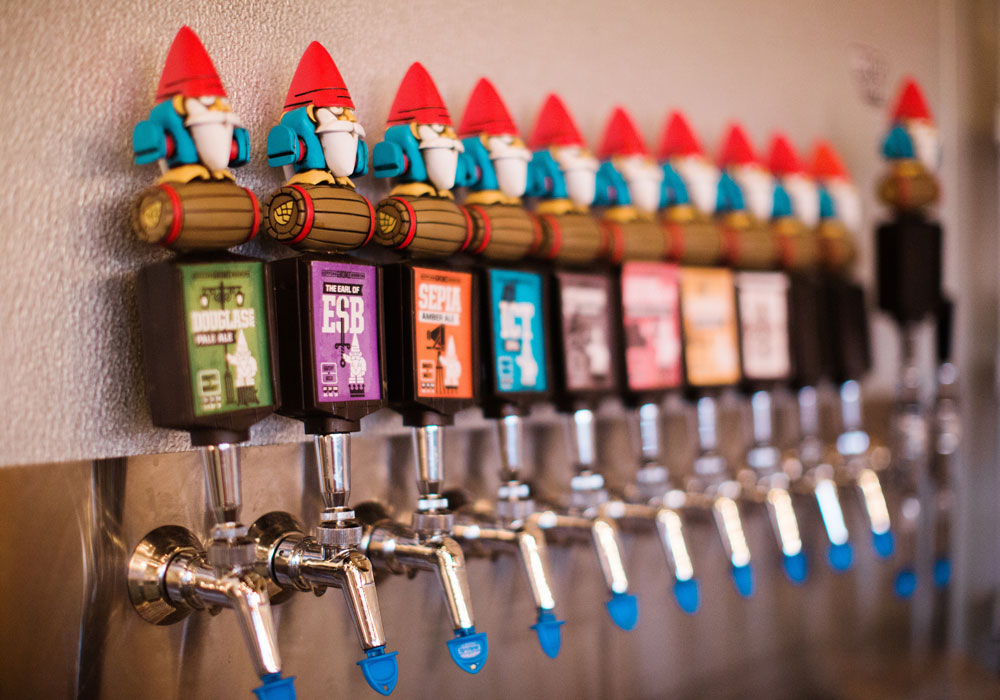
“There’s no place like Gnome” and “Take me Gnome tonight” are two popular phrases at Hopping Gnome Brewing CompanyOpens in new window in Wichita, Kansas. Owners Torrey and Stacy Lattin opened Hopping Gnome in 2015. The pair had several other names in mind, but after researching, they discovered that most names they liked were already taken. However, one night Torrey found a small gnome in their home that was a giveaway from the MLB All-Star Game at Kauffman Stadium in Kansas City. He was immediately inspired by his find and asked Stacy, “How about Hopping Gnome? You know, like hops, and gnomes are known for drinking.”
Stacy and Torrey wanted their brewery to stand apart from other local breweries such as River City and Wichita Brewing. A name like Hopping Gnome did the trick. Loyal customers refer to the brewery as “The Gnome” and have found a home in this strange, gnome filled sanctuary. Stacy recalls “[Customers] will give us garden gnomes to display in the taproom as well as send us gnome t-shirt ideas. We try to include the gnome theme whenever we can without being too over the top.” They even call their samplers “Gnome Pours” and blame the gnomes when the beer runs out.
(MORE: 9 Breweries to Follow on Instagram)
Fonta Flora Brewery | Morganton, NC
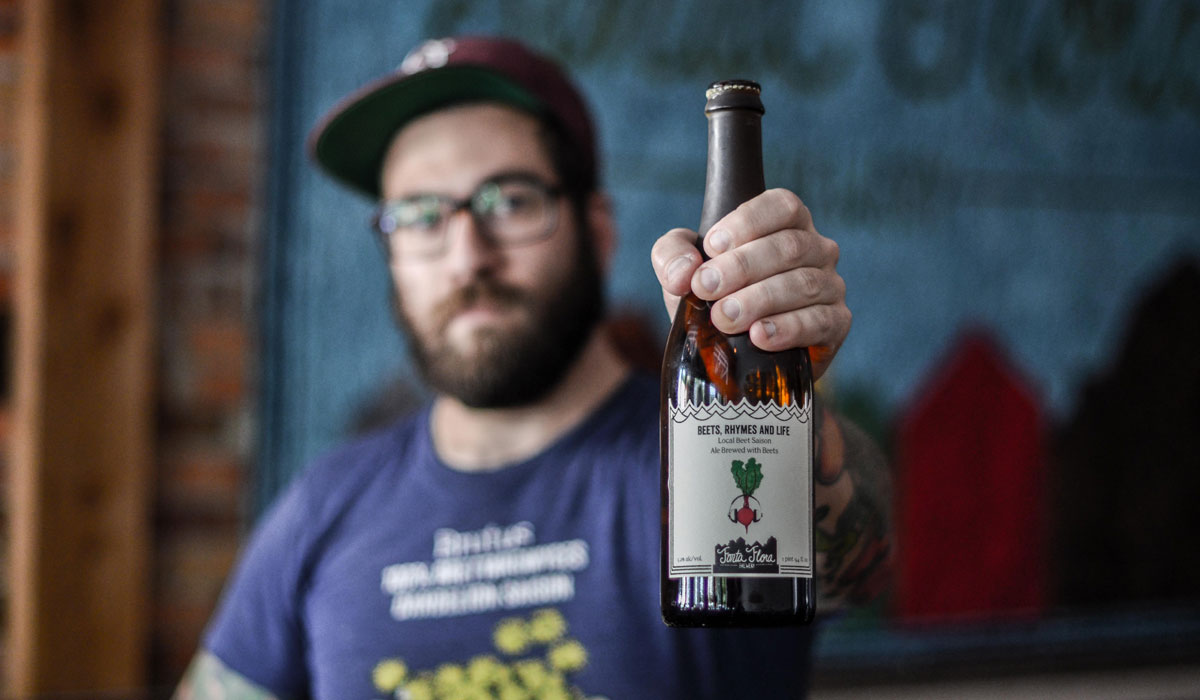
To some, Fonta Flora may sound like a fictional name out of a novel. However, the historical and cultural relevance in the name Fonta Flora BreweryOpens in new window spans across not only the exact location of the brewery itself, but also touches on the culture and brewing style that takes place there.
Located in Morganton, North Carolina, Fonta Flora Brewery is located on “The Lost Village” of Fonta Flora, a sharecropping settlement in Burke County. This settlement was flooded in 1916 to create Lake James and was discovered by a team of scuba divers decades later.
Located in the heart of Appalachia, Fonta Flora focuses on local agriculture and flora — the plants of a particular region, habitat, or geological period — when creating recipes. Co-owner and head brewer Todd Boera finds inspiration in this rich history.
“The ultimate drive in everything that we do stems from local culture and local agriculture, which also happens to be our slogan. We believe that the people that came before us and the culture they created is vitally important. For instance, ingredients such as corn grits, ramps, paw paw fruit and persimmons are as culturally important to Appalachia as they are agriculturally.”
The Appalachian Grisettes hold the top spot of favorite beers to brew at Fonta Flora. This line of Grisettes gives patrons a taste of true Appalachia by utilizing a heritage grain as the focal point. A favorite of Boera’s is Bloody Butcher, which is brewed with heritage red corn.
Gilgamesh Brewing Co. | Salem, OR
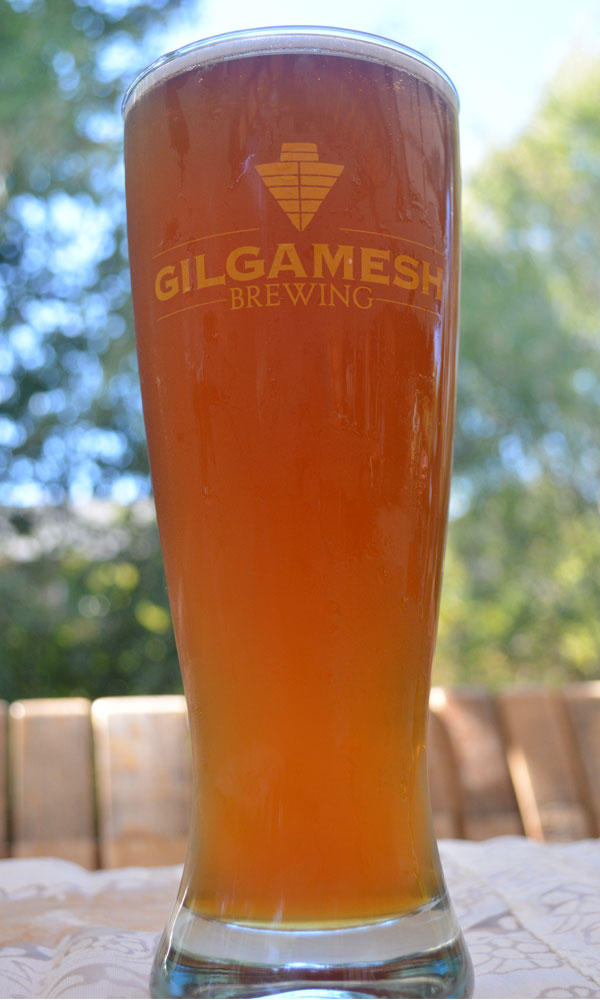
With a name like Gilgamesh, you know there has to be an epic story behind it. Matt Radtke, co-owner of Gilgamesh Brewing Co.Opens in new window describes how the Epic of Gilgamesh and the ancient Sumerians who wrote the tale shaped the naming of their brewery. The Sumerians were possibly the inventors of the wheel, bread and beer, according to Radtke. He describes the use of clay, conical shaped vessels the ancient Mesopotamians stored underground to ferment their “beer.” This conical symbol became the brewery’s logo. Radtke and his partners, who also happen to be his brothers and father, identified with the story of Gilgamesh and knew it was a perfect fit for their brewery.
A popular brew at Gilgamesh Brewing Co. is Mamba, an ale made with black tea, bergamot, tangerine peel and rye. Mamba is almost completely hopless, just like the fermented liquids of ancient Mesopotamia.
(MORE: ‘Mind-Blowing’ Beers Made from Barrel-Aged Coffee Beans)
Wooden Robot Brewery | Charlotte, NC
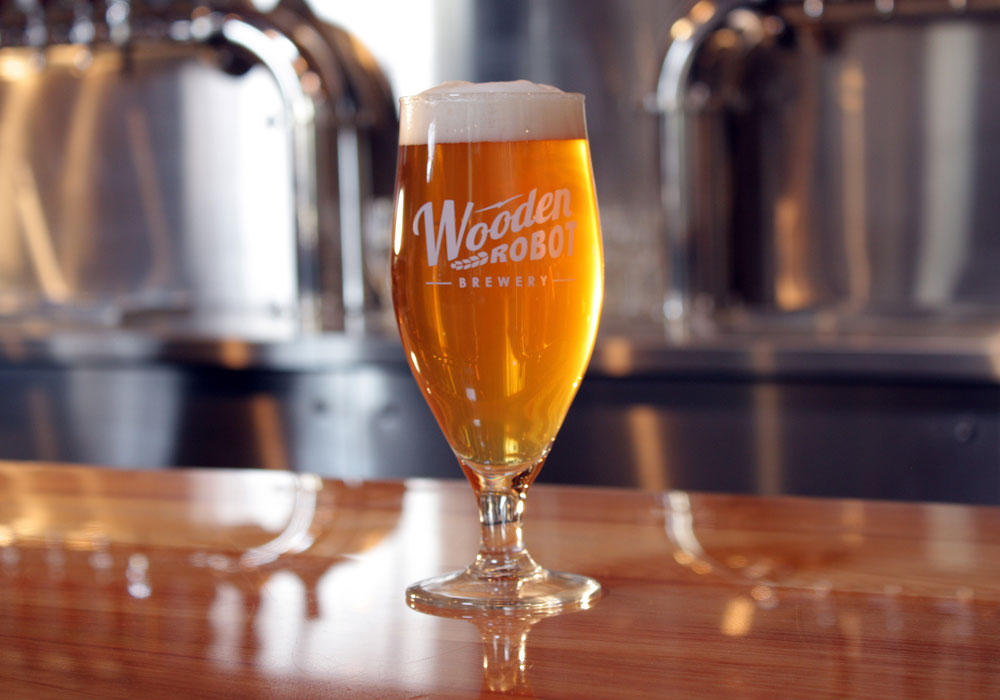
The juxtaposition of wood and robot make for an intriguing theme when naming a brewery. This theme helped create an environment of science, innovation and creativity for the brewers at Wooden Robot BreweryOpens in new window in Charlotte, North Carolina. Co-owner and CEO Josh Patton explains this juxtaposition and how it thrives within their brewery.
“Wooden Robot represents the blending of seemingly disparate elements into a wonderful union. The wood represents the brewing tradition that inspires us: high-quality ingredients, expressive yeast strains and extended aging in oak barrels,” Patton says. “The robot represents innovation: the unique, creative beers that we craft using these traditional methods and ingredients.”
The balance of art and science can be seen throughout the brewery and the beers they are creating. Head brewer Dan Wade brews a mix of traditional, Belgian-style ales as well as creative American styles to include hop forward and wild, barrel aged ales. The “wooden” aspect plays a large role in their barrel program, where they are utilizing smaller barrels and foeders (large aging vessels) to barrel age many different beers. Patton describes their City Slicker Farmhouse IPA as a Belgian inspired ale fermented in an oak foeder and dry hopped with Mosaic and Amarillo hops. The resulting flavors are a tart base with bold citrus and berry fruit characters. With the use of wooden barrels, Wade can show his truly artistic side as a brewer while maintaining the “robotic” qualities of brewing high-quality, hand-crafted beer.
Creature Comforts Brewing Co. | Athens, GA
Creature Comforts Brewing Co.Opens in new window in Athens, Georgia, was created from the dreams of two men looking to expand upon a passion for homebrewing and craft beer. David Stein, co-founder and head brewer, recalls his days of homebrewing: “I always thought that beer was an ultimate creature comfort. I also had an artist friend that drew these incredible creatures, and so I started calling my homebrew Creature Comforts, and using his art for the labels.” In turn, this became the brand that is now known as Creature Comforts Brewing Co.
Chris Herron, co-founder and CEO, further explains their tagline “Crave Curiosity” as a way to inspire people to explore their world around them and to find their true passions. This is what Creature Comforts represents for both Herron and Stein.
The most recognizable, physical adaptation of “creature comforts” is apparent in See the Stars, a Russian imperial stout aged for one year in maple bourbon barrels. See the Stars was released in September 2015 and is one of the first beers to come from Creature Comforts’ barrel program. The label features an interesting, whimsical creature amongst a background of stars.
Moody Tongue Brewing Co. | Chicago
Jared Rouben was not looking for a laugh when he founded Moody Tongue Brewing Co.Opens in new window in Chicago. While the term moody tongue may sound like someone who is being sassy, Rouben uses this term to describe someone with a discerning palate. Rouben has an extensive background in the culinary arts and brewing. He graduated from the Culinary Institute of America in New York and the Siebel Diploma Course in Chicago. On top of these accomplishments, he is also an examiner for the Master Cicerone program. Rouben’s culinary brewing philosophy is “using a chef’s mindset to highlight flavors and aromatics in balanced beers.” A moody tongue knows and appreciates delicately balanced, flavorful brews.
Distinctive flavors and food pairings for each beer are described on the website, such as the Caramelized Chocolate Churro Baltic Porter, which boasts flavors of Madagascar vanilla, Oaxacan chocolate and Mexican cinnamon. The suggested food pairings are fried chicken Livers, Jasper Hill Farm Blue Cheese, and bourbon bread pudding.
(MORE: What ‘Selling Out’ Is Actually About)
Lord Hobo Brewing Co. | Woburn, MA
Trying to think of a unique creative name for a brewery can be difficult, but sometimes all it takes is a playful tussle between two friends. Daniel Lanigan, the owner of Lord Hobo Brewing Co.Opens in new window in Woburn, Massachusetts, recalls a night out with his best friend, Nathan Hobbs, better known as Hobo. During a night out, Hobo began acting a certain way that Lanigan did not find very appealing. His poor attitude and behavior led Lanigan to announce that Nathan “really is the Lord of hobos.” Thus, the name Lord Hobo was created.
Later, Lanigan opened a craft beer bar in Cambridge, Massachusetts, which he named Lord Hobo after that fateful night. Over time, Lord Hobo became a popular spot for locals to grab a craft beer and gained an upstanding reputation within the New England craft beer community. Lanigan eventually decided to follow his passions and opened a production brewery of the same name.
Bearded Iris Brewing | Nashville
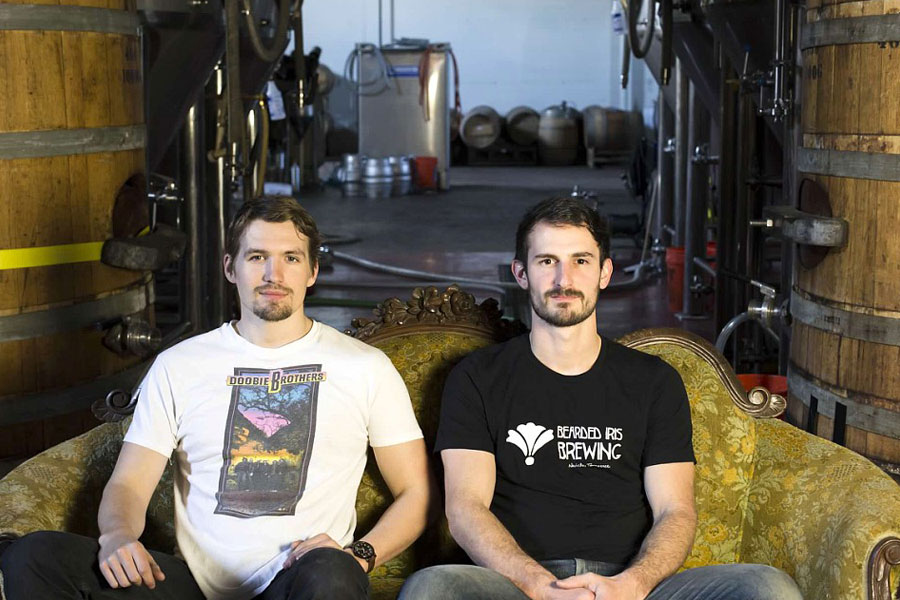
The Bearded Iris is the Tennessee State flower, making it a viable choice when naming a brewery in Nashville. Nonetheless, the name itself contains much deeper meaning to the community at Bearded Iris BrewingOpens in new window. This flower is known for its aesthetic appeal, hardiness and adaptability. Located in an art-forward neighborhood, Bearded Iris Brewing pulls inspiration from the art community, which highly reveres the beauty of the Bearded Iris. New varieties of the flower are continuously cultivated, embodying timeless beauty and contemporary relevance; founders Paul Vaughn and Kavon Togrye “strive to meld Old World brewing techniques with an ever-evolving spirit of innovation,” says Chanda Grubbs, who is in charge of field and social media marketing for the brewery.
This theme is reflected in all aspects of their brewery. Vaughn, head brewer, names each beer after a specific Bearded Iris variety. Their tagline, “Cultivate Variety,” continues the spirit of brewing unique and innovative, yet timeless beers. Grubbs further explains, “We have a saison currently in the tanks that features foraged sweet goldenrod and smooth sumac along with aged cascade hops and our house culture. This beer will be transferred into French oak barrels for conditioning. With this saison, we’re reimagining a classic beer style and process as well as using locally foraged ingredients, all to ultimately produce a wholly unique and innovated new product.”
The aesthetic of the taproom also reflects the art and science of Bearded Iris Brewing, meshing a beautifully crafted, open air taproom with the scientific production facility.
Funky Buddha Brewery | Oakland Park, FL
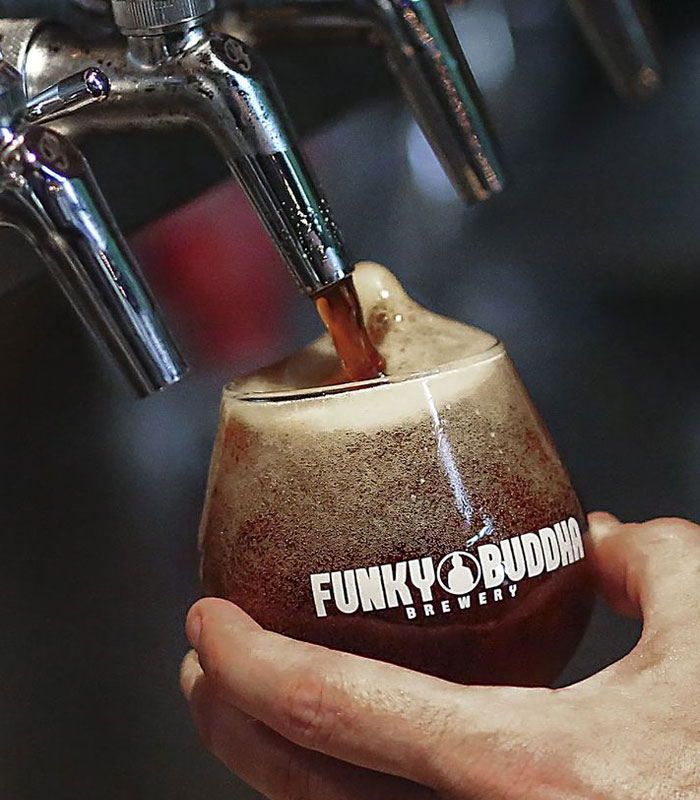
While some brewery names are created to fit the brewery, Funky Buddha fit their brewery to an already existing name. Owner Ryan Sentz rebranded his craft beer lounge and tea bar into what is now known as Funky Buddha BreweryOpens in new window. R & R Tea Bar, Sentz’s first endeavor, began as a hookah lounge and tea bar. Later, he added a large selection of craft beers. As the R & R Tea Bar and Funky Buddha Lounge’s popularity grew, Sentz realized his passion for homebrewing could morph into something more.
The culture of that original Funky Buddha Lounge expands into their beers and marketing. Funky Buddha Brewery creates unique, outside the box beers, utilizing interesting ingredients to achieve over-the-top flavors and aromas. Many of their beers create a flavor profile that mimics certain foods and leaves a lasting impression on craft beer fans, such as their Blueberry Cobbler Ale, Sweet Potato Casserole Strong Ale, Maple Bacon Coffee Porter and French Toast Double Brown Ale. While what’s inside the bottle may seem most important, the outer label also helps create a lasting impression. Funky Buddha’s labels are bright and colorful, and often cartoonish. These labels aid in the overall experience when enjoying a Funky Buddha brew.
CraftBeer.com is fully dedicated to small and independent U.S. breweries. We are published by the Brewers Association, the not-for-profit trade group dedicated to promoting and protecting America’s small and independent craft brewers. Stories and opinions shared on CraftBeer.com do not imply endorsement by or positions taken by the Brewers Association or its members.
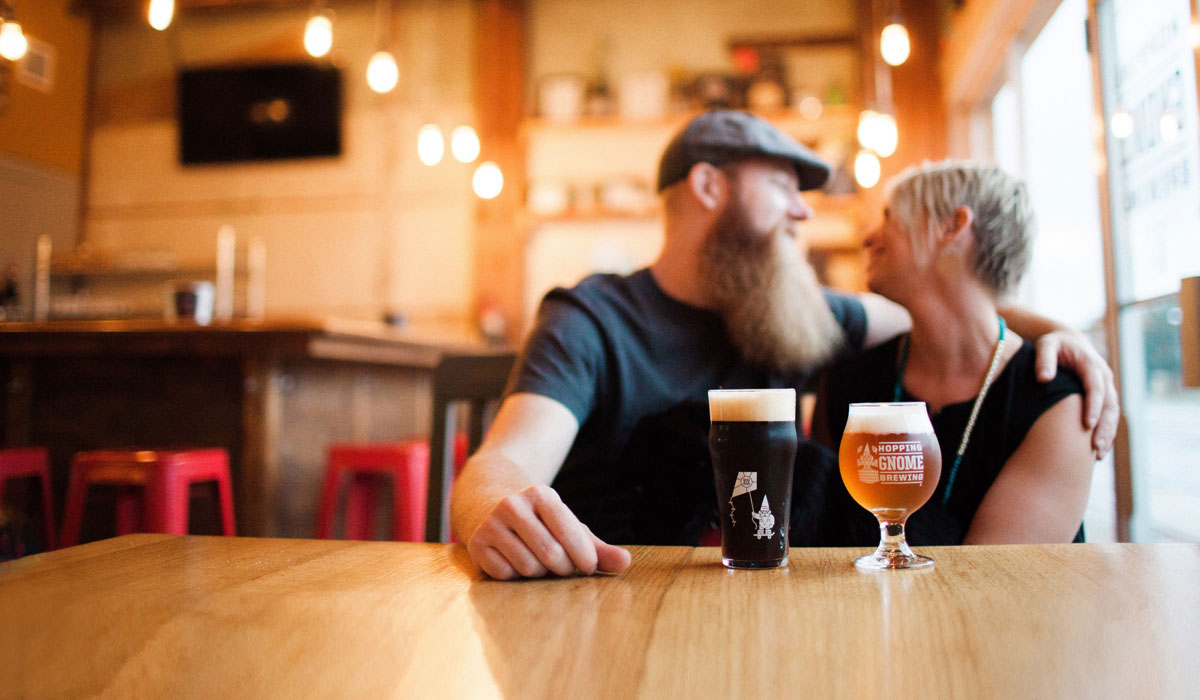

Share Post